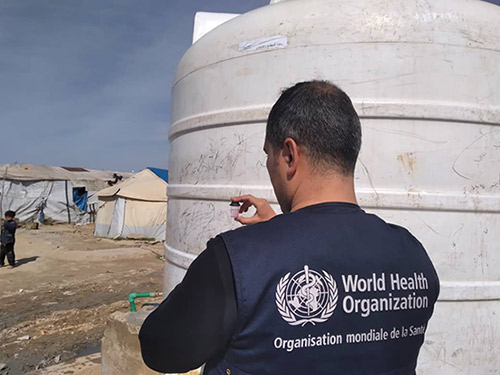 A WHO staff member collects a water sample for testing in Al-Hol camp to help ensure safe drinking water for displaced families. Photo: WHO
A WHO staff member collects a water sample for testing in Al-Hol camp to help ensure safe drinking water for displaced families. Photo: WHO
21 May 2025, Damascus, Syrian Arab Republic – With cholera cases resurging across parts of Syria in late 2024 and rising outbreak risks as warm weather returns to the country, the World Health Organization (WHO) has launched a 6-month emergency health and WASH response to protect more than 850 000 people at highest risk in Aleppo, Lattakia, Al-Hasakeh and Damascus.
Between August and December 2024, Syria reported 1444 suspected cholera cases and 7 associated deaths, with the highest caseloads in Lattakia, Al-Hasakeh and Aleppo and displacement sites such as Al-Hol camp. The outbreak is linked to ongoing drought, population movement and repeated disruptions to water and sanitation systems.
WHO’s response combines targeted health and water, sanitation and hygiene (WASH) interventions, focusing on early detection, case investigation, cholera diagnostics and the deployment of rapid response teams to high-risk areas. The response also includes risk communication, infection prevention and control, and sustained water quality monitoring. Water purification tablets and testing kits will be distributed to reduce the risk of transmission from unsafe sources.
“This response is designed to catch outbreaks early, isolate risks quickly and help communities protect themselves,” said Acting WHO Representative in Syria Christina Bethke. “We are strengthening surveillance through the Early Warning Alert and Response System (EWARS), expanding lab capacity to confirm cholera cases faster and supporting health workers and volunteers to respond in real time. In parallel, we’re enhancing water safety testing in camps and communities, equipping teams with purification tools and delivering key health messages to reduce exposure risks.”
The intervention, which supports national efforts to strengthen outbreak preparedness and response, together with public health recovery, is being implemented in partnership with the Ministry of Health, water authorities and local authorities. Activities include refresher training for laboratory staff, improved inter-ministerial coordination and localized action in more than 40 informal settlements and displacement sites.
This response has been made possible thanks to the generous support of the Syria Humanitarian Fund (SHF) a multi-donor mechanism managed by the United Nations Office for the Coordination of Humanitarian Affairs (OCHA) that enables rapid, flexible funding for frontline health and humanitarian partners based on local needs.
Media contact:
Halah Kabash, Cette adresse email est protégée contre les robots des spammeurs, vous devez activer Javascript pour la voir.




